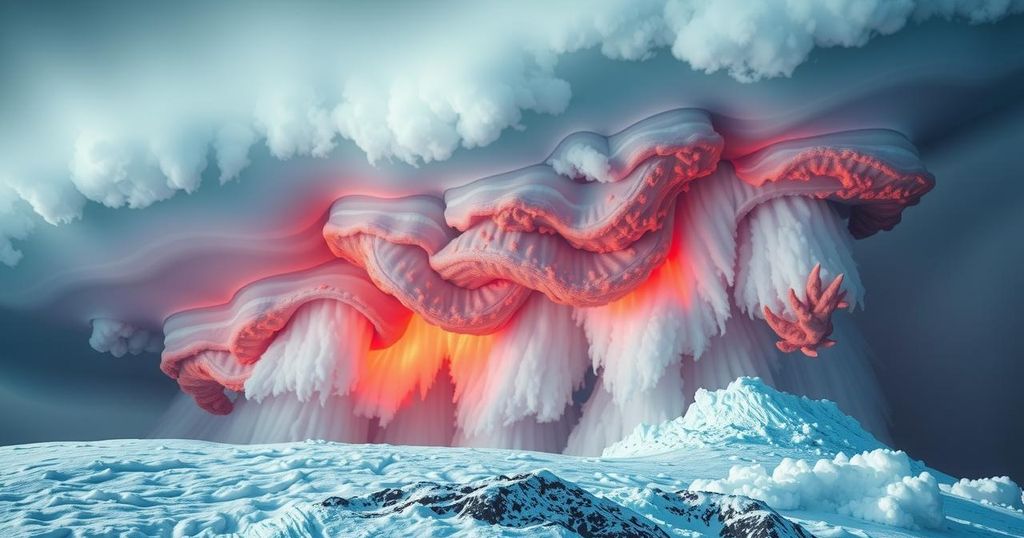Understanding the Intersection of Climate Change and Extreme Weather Events

The onset of 2025 has been marked by severe weather events, including high winds and destructive wildfires. Scientists have confirmed that climate change led to 2024 being the hottest year recorded. Recent advancements enable clearer connections between climate change and weather extremes, highlighting a significant increase in events like heat waves since the 1960s.
The year 2025 commenced with a series of extraordinary weather patterns, including 100-mph winds in Southern California that led to unprecedented wildfires, alongside significant winter storms affecting the Mid-Atlantic and Southern regions. Concurrently, scientists worldwide acknowledged that 2024 was registered as the hottest year in recorded history due to human-induced climate change. In recent years, advancements in scientific methodologies have enabled researchers to connect distinct weather events to climate change, with focus on phenomena such as heat waves and hurricanes.
While not every weather anomaly is directly attributable to climate change, the gradual increase in global temperatures has become evident in numerous extreme weather occurrences. Justin Mankin, a climate scientist at Dartmouth College, notes the evolution of weather patterns, suggesting new possibilities that had previously been unrecorded. He illustrates the difference between climate and weather by stating, “The climate is basically the clothes you have in your closet,” while daily weather selections can reflect remarkable variability.
Scientists traditionally define climate as a 30-year average of weather conditions, where unusual, sporadic weather contributes less significance to overall averages. Deepti Singh, from Washington State University, emphasizes that daily variations in weather will continue, even amid ongoing climate change. Rising global temperatures, having increased by approximately 1.3 degrees Celsius since the mid-1800s, primarily due to fossil fuel combustion, have subtle yet persistent effects on daily weather patterns. In many regions, there are now fewer instances of freezing temperatures, notably in states such as Michigan and Ohio, and the frequency of heat waves has more than tripled since the 1960s.
Climate change also modifies intricate atmospheric and oceanic interactions, resulting in unprecedented weather phenomena. The 2021 Pacific Northwest heat wave was significantly more intense due to climate change yet stemmed from atmospheric conditions that were largely unprecedented in the area. Alex Hall, a climate scientist at UCLA, refers to this phenomenon as having “put the climate on steroids,” indicating the potential for extraordinarily extreme weather events.
Recent scientific progress in detection and attribution techniques has allowed climate experts to critically assess the influence of human activities on weather phenomena. By using climate models to simulate scenarios absent of human-induced climate change, researchers can estimate the effects of fossil fuel emissions on the intensity and probability of weather events. For instance, the rainfall from Hurricane Helene was identified to be 10% more intense due to climate change influences and at least 40% more likely to occur. Mankin likens the analysis to clinical trials in medicine, where outcomes are compared between treatment and non-treatment groups.
In conclusion, while not every weather anomaly can be directly linked to climate change, the extensive body of evidence indicates that human activities significantly shape our current weather patterns. Ongoing scientific development, coupled with a growing understanding of climate impacts, continues to educate the public about the complexities of climate-related weather phenomena. The importance of distinguishing between anomalies and long-term climate trends remains imperative as society anticipates the environmental challenges ahead.
The article discusses recent extreme weather events and their relation to climate change. It showcases examples such as wildfires and unusual winter storms while highlighting scientific advancements in understanding the impact of climate change on various weather phenomena. Furthermore, it explains the difference between weather and climate and emphasizes how rising temperatures due to human activity influence daily and extreme weather patterns, underpinning the importance of research linking weather events to climate change effects.
In summary, the relationship between climate change and extreme weather is increasingly evident, with advancements in science providing clarity on this complex issue. Although not all weather variations can be directly attributed to climate change, the overarching trends indicate significant influences on both typical and extreme weather events. Continued research and public awareness are essential for addressing the implications of these climatic changes for future resiliency and adaptation.
Original Source: www.weku.org







